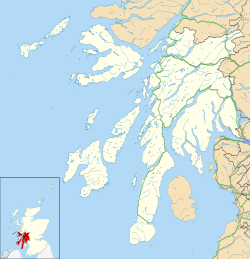| Arden | |
|---|---|
 Houses at Arden | |
Location within Argyll and Bute | |
| OS grid reference | NS3684 |
| Council area | |
| Country | Scotland |
| Sovereign state | United Kingdom |
| Post town | Alexandria |
| Postcode district | G83 |
| Dialling code | 01389 |
| Police | Scotland |
| Fire | Scottish |
| Ambulance | Scottish |
| UK Parliament | |
| Scottish Parliament | |
Arden is a village on the southwest shore of Loch Lomond in Argyll and Bute, Scotland. [1]
